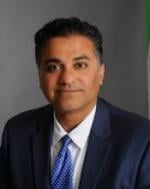 Sanjay J. Mathew, M.D. is the Marjorie Bintliff Johnson and Raleigh White Johnson, Jr. Vice Chair for Research and Professor in the Menninger Department of Psychiatry & Behavioral Sciences at Baylor College of Medicine. He is also a staff psychiatrist at the Michael E. Debakey VA Medical Center (MEDVAMC) in Houston, Texas. He graduated from Dartmouth College and Baylor College of Medicine, and trained in psychiatry at Columbia University and the New York State Psychiatric Institute, where he also completed a NIH-funded research fellowship in affective and anxiety disorders. Dr. Mathew began his faculty career at the Icahn School of Medicine at Mount Sinai where he co-founded and directed the Mood & Anxiety Disorders Program. In 2010, Dr. Mathew was recruited back to his hometown of Houston to direct Baylor’s Mood & Anxiety Disorders Program. His research program focuses on developing novel therapies for patients with treatment-resistant mood and anxiety disorders and PTSD, with a particular focus on rapid-acting glutamate-modulating agents.
Sanjay J. Mathew, M.D. is the Marjorie Bintliff Johnson and Raleigh White Johnson, Jr. Vice Chair for Research and Professor in the Menninger Department of Psychiatry & Behavioral Sciences at Baylor College of Medicine. He is also a staff psychiatrist at the Michael E. Debakey VA Medical Center (MEDVAMC) in Houston, Texas. He graduated from Dartmouth College and Baylor College of Medicine, and trained in psychiatry at Columbia University and the New York State Psychiatric Institute, where he also completed a NIH-funded research fellowship in affective and anxiety disorders. Dr. Mathew began his faculty career at the Icahn School of Medicine at Mount Sinai where he co-founded and directed the Mood & Anxiety Disorders Program. In 2010, Dr. Mathew was recruited back to his hometown of Houston to direct Baylor’s Mood & Anxiety Disorders Program. His research program focuses on developing novel therapies for patients with treatment-resistant mood and anxiety disorders and PTSD, with a particular focus on rapid-acting glutamate-modulating agents.
Dr. Mathew’s research program has been funded by NIMH, Department of Veterans Affairs, Patient-Centered Outcomes Research Institute (PCORI), and industry in the areas of experimental therapeutics and pathophysiology of treatment-resistant depression, suicide, and PTSD. He has authored or co-authored over 130 manuscripts and book chapters, and serves on the editorial board of several journals. In addition to his long involvement with ADAA including serving as Chair of the Program Committee (2017-2018), Dr. Mathew is a member of the American College of Neuropsychopharmacology, and board member of the American Society of Clinical Psychopharmacology. An active clinician and teacher, Dr. Mathew has been selected by his peers as a “Best Doctor” every year since 2011, and has received awards for his teaching of psychopharmacology.
Dr. Mathew has been an ADAA member since 2000 and is currently ADAA's President-Elect and Chief Medical Officer.











